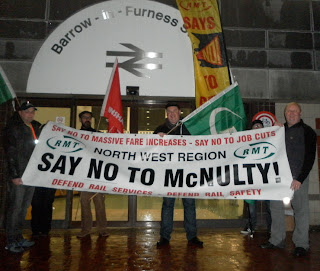 |
| LEAFLET CAMPAIGN BARROW STATION 5 NOV 2012 |
Pouring rain did not hinder leaflet distribution at Barrow railway station on the morning of 1st November. Photos were taken during all too brief gaps in the heavy showers and members of the public willingly accepted the leaflets that were offered to them. Some, having read the leaflet, actually thanked the assembled trade unionists for the work of trying to save the rail service before rushing off to board their train taking them to their place of employment.
The dozen or so campaigners who began at 5.45am were joined by others as the morning brightened and the rain eased until, at 8.30 (just thirty minutes before the end of the campaign) a reporter and photographer from the local press arrived and 'interviews' were earnestly conducted. Three activists of Barrow Trades Union Council (RMT and NUT delegates plus GMB member and Unite Against Fascism organiser) attended throughout but the secretary and chairman were absent.
IF LEADERS FAIL TO LEAD, THERE IS NO LEADERSHIP.
In an earlier posting I mentioned the failure of the secretary of Barrow Trades Union Council to attend a public meeting to promote the work of the organisation and the refusal of the chairman to speak at the event. Frankly, I cannot understand this attitude yet it is one that seems to be common to most organisations here in south Cumbria - persons get themselves elected (or appointed) to positions of responsibility and then utterly fail to honour that responsibility.
Take, for example, the secretary of Cumbria Unison, Deborah Hamilton, - responsible, since 2009 for co-ordinating the anti-austerity campaign in the area from Barrow to Kendal - who, except for a very brief appearance at Barrow market entrance one very wet Saturday - has never ever played any part in the campaign.....a campaign organised and sustained for three years by just three pensioners without any assistance from any other organisation. Churches did not wish to know. Charities would not assist for fear of being considered 'political' which could threaten their funding status. The Trades Union Council was not interested and the local Labour Party could not support an anti-austerity campaign because, if elected, it would impose an austerity programme of its own!
Appeals to the secretary of Barrow TU Council to promote support for the anti-cuts campaign were steadfastly ignored but, some eighteen months later, following two articles in the local paper in which the secretary appealed for TU delegates to support the local TUC or risk him having to 'wrap it up', the pensioners (each a member of a trade union) decided to assist the Trades Council. More delegates responded and it seemed that Barrow TUC had been saved from extinction. There were, however, ominous warning signs.....nobody would accept the position of treasurer. The chairman elected at that very first meeting never ever made another appearance! And so the local TUC limped through that year with the secretary doubling up as treasurer also.
The following year (current) saw the election of a chairman, George Appleton (former secretary of the now defunct Ulverston TUC) but still no treasurer - thus the unsatisfactory arrangement of a joint secretary/treasurer is set to continue.
In a previous posting I described the farcical pantomimes of two Barrow TUC meetings
and do not need to repeat these here. They arose because of illiteracy and lack of firm leadership and this situation prevails. As both the chairman and secretary are now both in their 60s it is doubtful that even an intensive remedial course in English would improve their comprehension but they may still have the capacity to understand that they must contribute more if the council is to be saved for the future.
Currently, the secretary and chairman appear to believe that the secretary is merely a clerk and the chairman a conductor - the first handles correspondence and literature once a month and the second manages the agenda much the same way as a conductor manages an orchestra (except the orchestra here is comprised of musicians each playing from a different music sheet with the result that we end up with a discordant racket that nobody wants to listen to!)
Some local people get elected onto the local borough council and then do nothing except attend the occasional borough council meeting. Fulltime, paid, TU officials rarely leave their offices and will not support local initiatives. Elected officers of voluntary organisations do not wish to campaign on local issues. Local politicians remain silent as people's living standards plummet. Yes, the message is clear - those who bask in their 'status', who like to mouth off for the local press and maybe get their mugshot published for all to see could not really give a toss about those they claim to represent. And, of course, it will continue like this until those who put these people into these positions of responsibility decide to bring them to account.






